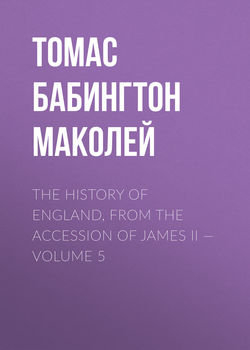The History of England, from the Accession of James II — Volume 5

Реклама. ООО «ЛитРес», ИНН: 7719571260.
Оглавление
Томас Бабингтон Маколей. The History of England, from the Accession of James II — Volume 5
PREFACE TO THE FIFTH VOLUME
CHAPTER XXIII
CHAPTER XXIV
CHAPTER XXV
Отрывок из книги
THE rejoicings, by which London, on the second of December 1697, celebrated the return of peace and prosperity, continued till long after midnight. On the following morning the Parliament met; and one of the most laborious sessions of that age commenced.
Among the questions which it was necessary that the Houses should speedily decide, one stood forth preeminent in interest and importance. Even in the first transports of joy with which the bearer of the treaty of Ryswick had been welcomed to England, men had eagerly and anxiously asked one another what was to be done with that army which had been formed in Ireland and Belgium, which had learned, in many hard campaigns, to obey and to conquer, and which now consisted of eighty-seven thousand excellent soldiers. Was any part of this great force to be retained in the service of the State? And, if any part, what part? The last two kings had, without the consent of the legislature, maintained military establishments in time of peace. But that they had done this in violation of the fundamental laws of England was acknowledged by all jurists, and had been expressly affirmed in the Bill of Rights. It was therefore impossible for William, now that the country was threatened by no foreign and no domestic enemy, to keep up even a single battalion without the sanction of the Estates of the Realm; and it might well be doubted whether such a sanction would be given.
.....
That Duncombe had been guilty of shameful dishonesty was acknowledged by all men of sense and honour in the party to which he belonged. He had therefore little right to expect indulgence from the party which he had unfairly and malignantly assailed. Yet it is not creditable to the Whigs that they should have been so much disgusted by his frauds, or so much irritated by his attacks, as to have been bent on punishing him in a manner inconsistent with all the principles which governments ought to hold most sacred.
Those who concurred in the proceeding against Duncombe tried to vindicate their conduct by citing as an example the proceeding against Fenwick. So dangerous is it to violate, on any pretence, those principles which the experience of ages has proved to be the safeguards of all that is most precious to a community. Twelve months had hardly elapsed since the legislature had, in very peculiar circumstances, and for very plausible reasons, taken upon itself to try and to punish a great criminal whom it was impossible to reach in the ordinary course of justice; and already the breach then made in the fences which protect the dearest rights of Englishmen was widening fast. What had last year been defended only as a rare exception seemed now to be regarded as the ordinary rule. Nay, the bill of pains and penalties which now had an easy passage through the House of Commons was infinitely more objectionable than the bill which had been so obstinately resisted at every stage in the preceding session.
.....